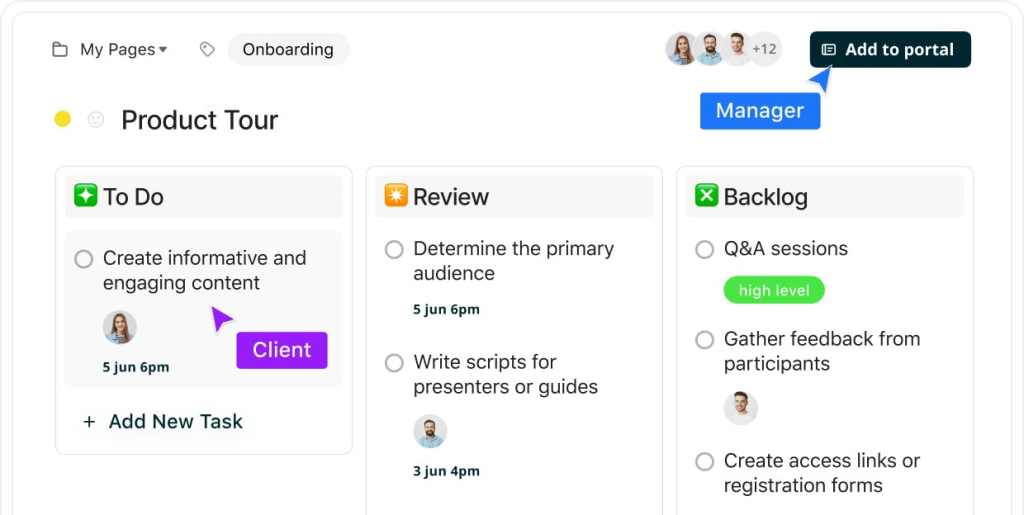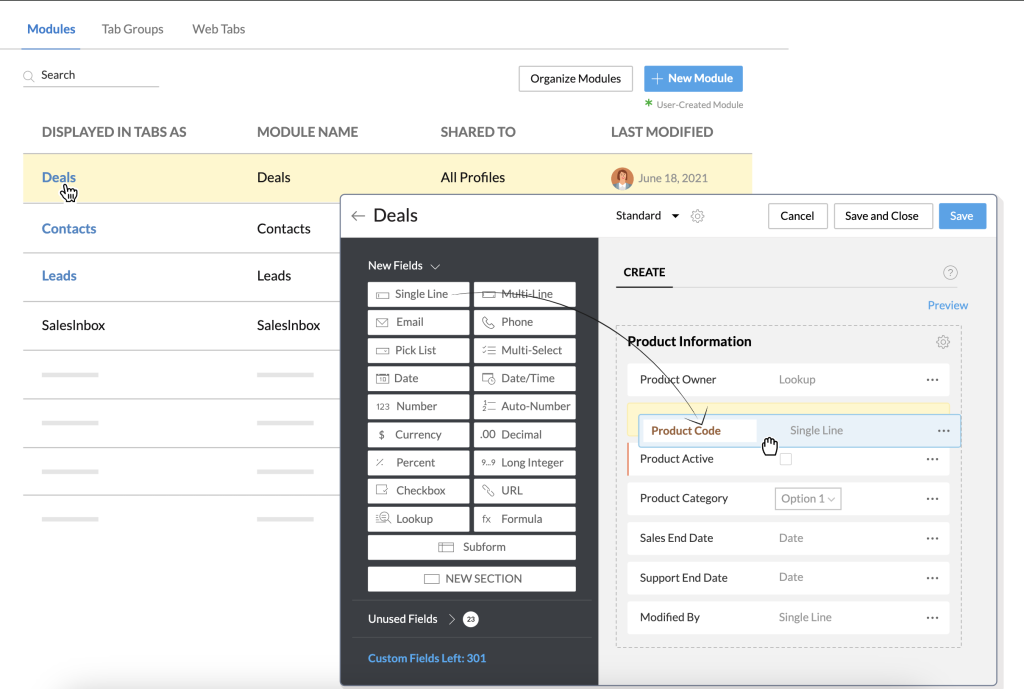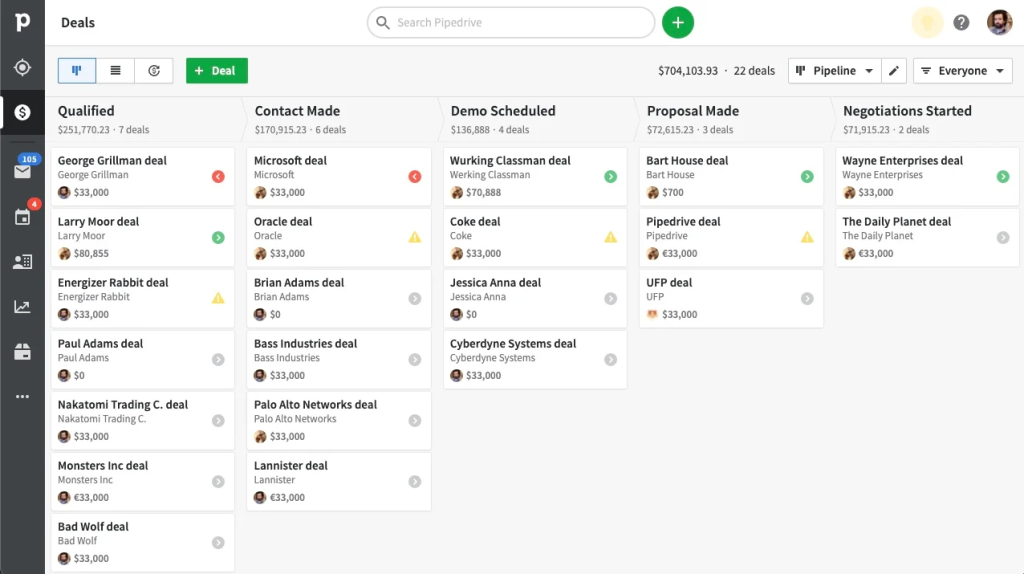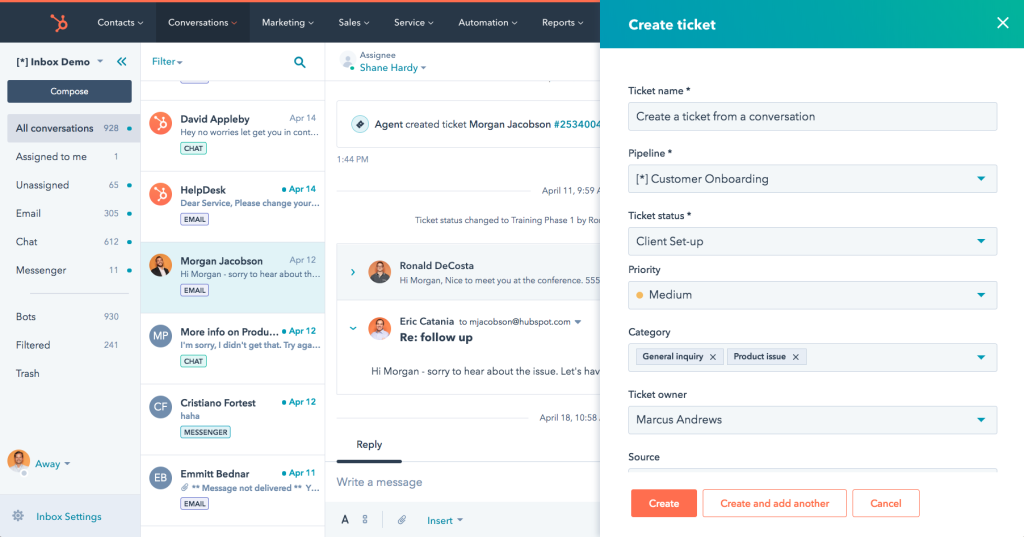
In the fast-paced world of startups, where agility and efficiency are paramount, having the right tools can make all the difference. As a founder or team member of a burgeoning company, you’re likely juggling multiple hats, from sales and marketing to customer support and product development. Amidst this whirlwind of activity, there’s one ally that can help you stay organized, foster customer relationships, and drive growth: a Customer Relationship Management (CRM) system.
In this blog post, we’ll delve into the world of CRM systems tailored for startups. We’ll explore what makes a CRM system “the best” for the startup ecosystem, discuss key features to look for, and provide practical advice on how to choose and implement the right CRM for your venture. Whether you’re in the early stages of your startup or looking to scale, understanding how to leverage a CRM can be a game-changer for your business success. Let’s get started on this journey to unlocking the full potential of your customer relationships.
What is CRM?
CRM software has revolutionized how businesses interact with customers and manage relationships. Since its inception in 1995, the CRM industry has boomed, with revenues skyrocketing from $13 billion in 2010 to $69 billion in 2020, as reported by Statista.
CRM stands for Customer Relationship Management, encompassing both a strategic approach to customer interactions and the technology that supports it. A CRM system is a software tool that centralizes customer information, automates interactions, and streamlines business processes across various departments.
In a typical business environment, sales, marketing, and finance teams use a plethora of tools for their respective tasks, from managing data and communication to scheduling and financial planning. A CRM tool integrates these functions into one platform, enhancing efficiency and providing valuable insights into customer preferences and business operations.
CRM Types and Key Features
Understanding the different types of Customer Relationship Management (CRM) systems is essential for startups looking to enhance their customer engagement and streamline their business processes. An operational CRM is the engine that powers your daily business functions, automating tasks across marketing, sales, and customer service. It simplifies the progression from lead to loyal customer by managing the sales cycle and clearly defining the customer journey. This type of CRM is particularly beneficial for startups looking to reduce the manual workload and increase the efficiency of their operations.
In contrast, an analytical CRM focuses on the interpretation of customer data to reveal behavioral patterns and trends. It’s a powerful tool for startups that want to make data-driven decisions to refine their marketing strategies and improve sales outcomes. With an analytical CRM, a startup can enhance its customer service and identify new opportunities for growth by understanding the nuances of customer interactions and preferences.
The collaborative CRM emphasizes the importance of unity and communication among all parties involved in the business, from internal teams to external partners like suppliers and distributors. By promoting the sharing of information and making it readily accessible, this CRM type ensures that everyone is on the same page, which can significantly boost customer satisfaction and loyalty. Startups that prioritize a collaborative approach will find this CRM type instrumental in achieving higher retention rates and better profit margins.
Lastly, a strategic CRM is all about fostering enduring customer relationships through a dedicated customer-centric approach. It’s designed for startups intent on building a strong, customer-focused culture that values personalized experiences. Adopting a strategic CRM means that a startup is fully invested in enhancing customer lifetime value, with every business decision and innovation aimed at deepening customer connections and loyalty.
Signs Your Small Business Needs a CRM Software
To navigate the complex landscape of startup success, a structured approach is not just helpful—it’s essential. This is where a Customer Relationship Management (CRM) solution comes into play. By integrating a CRM system from the beginning, founders can ensure that their vision is supported by a solid foundation of data-driven strategy and operational efficiency. This balance between big-picture thinking and attention to detail can make all the difference in the competitive startup arena.
Starting and running a small business involves managing countless details, from remembering to call potential customers to keeping track of client preferences like bathroom curtain colors or coffee flavors. As your business grows, so does the complexity of managing these details, often leading to mistakes like missed meetings or mixed-up communications due to the use of multiple, disjointed tools
To maintain strong customer relationships, manage financial documents, onboard new salespeople, expand offerings, and execute marketing strategies effectively, a Customer Relationship Management (CRM) tool is essential. Implementing a CRM from the outset can help keep interactions with customers clear and organized, setting the foundation for potential growth into a successful, larger enterprise.
Benefits of Using CRM For Startups
When you picture the typical startup founder, you likely envision a passionate visionary, someone driven by the desire to create change and innovate. In the whirlwind of pursuing these grand ambitions, it’s easy for the nitty-gritty details such as Return on Investment (ROI) and Key Performance Indicators (KPIs) to take a backseat. Yet, it’s these very metrics that often determine whether a startup soars or stumbles.

While established corporations have long recognized the value of CRMs, startups are uniquely positioned to reap their benefits from day one. A CRM system isn’t just a repository for contact information; it’s a powerful platform that can:
- Centralize Customer Data: Keep all customer interactions, from emails to sales calls, in one place for easy access and analysis.
- Streamline Communication: Ensure that your team presents a unified front to customers, with shared information and collaboration tools.
- Automate Tasks: Reduce the time spent on repetitive tasks, allowing you to focus on what truly matters—growing your business.
- Enhance Customer Experience: Provide personalized service that can turn satisfied customers into loyal advocates.
- Drive Informed Decisions: Leverage data analytics to understand customer behavior and refine your sales and marketing strategies.
What Startup Problems Does a Business CRM Software Solve?
A CRM solution often seems like a magic fix, offering better productivity, enhanced collaboration, greater staff autonomy, and higher profits. For startups, characterized by innovation, rapid growth, and high risk, these benefits can be crucial. The flexible, scalable nature of CRM tools can help manage risks and foster growth, making them particularly valuable for startups facing uncertain success paths. Why not consider how a CRM could address your startup’s unique challenges?
Centralized Customer Information
- Problem: Disorganized customer data scattered across various platforms.
- Solution: CRM provides a unified database for all customer information, streamlining data management.
Improved Customer Service
- Problem: Inconsistent customer experiences due to unstructured service protocols.
- Solution: CRM standardizes customer service workflows, ensuring uniform quality of support.
Sales Process Automation
- Problem: Manual and repetitive sales tasks leading to inefficiency.
- Solution: CRM automates routine sales activities, freeing up time for more strategic work.
Enhanced Communication
- Problem: Miscommunication within teams and with customers.
- Solution: CRM facilitates better internal team collaboration and clearer communication with customers.
Data-Driven Decision Making
- Problem: Decisions made without the backing of solid data.
- Solution: CRM offers analytics and reporting tools for data-driven insights and decisions.
Efficient Lead Management
- Problem: Mismanaged leads resulting in lost sales opportunities.
- Solution: CRM provides tools for effective lead tracking and nurturing, improving conversion rates.
Increased Customer Retention
- Problem: High customer turnover due to unaddressed needs or dissatisfaction.
- Solution: CRM analyzes customer data to help predict and respond to client needs, enhancing loyalty.
Scalability
- Problem: Challenges in managing a growing customer base.
- Solution: CRM is scalable, accommodating increased customer volume and more complex business processes.
Streamlined Collaboration
- Problem: Departmental silos hindering teamwork.
- Solution: CRM encourages information sharing and cooperative work across departments.
Marketing Campaign Management
- Problem: Poorly targeted marketing efforts with inadequate tracking.
- Solution: CRM integrates with marketing tools for precise targeting and performance tracking of campaigns.
The Startup Dilemma – To CRM or Not to CRM?
Are you wondering if it’s too early to invest in a CRM for your startup? It’s a common concern as your customer base begins to grow. You might believe that a CRM system is a luxury you can’t afford or don’t need just yet. However, the truth is, the right CRM can be a game-changer, even for the smallest of startups. Early customers are the backbone of your future success, and their satisfaction is paramount. CRM tools are designed to enhance customer experience and provide valuable insights into their behavior, which can be critical for your growth from the outset.
Can you really afford a CRM? Startups often operate on tight budgets, making every investment a critical decision. While there are free CRM options available, they come with limitations. As your salesforce expands, the need for a more robust system becomes evident. Investing in a CRM might seem daunting, but the returns on customer retention and lead conversion can be substantial, often recouping the costs within months.
Will your team be able to adopt a CRM without hassle? Startups are fast-paced environments, and adding a new system to the mix might seem overwhelming. However, CRM tools are no longer the complex behemoths they once were. Vendors understand the need for user-friendly solutions, and many CRMs are now designed with ease of use as a priority. A bit of initial training can lead to a more efficient, data-driven, and customer-centric operation.
- Consider the Timing: Reflect on the importance of customer relationships from the start and how a CRM can support this.
- Evaluate the Investment: Look beyond the initial cost and consider the long-term benefits and ROI of a CRM system.
- Focus on Usability: Choose a CRM that offers a seamless user experience to ensure quick adoption and minimal disruption.
Which Business Applications Should Your CRM Integrate with?
A CRM system, much like a smartphone, centralizes various tools and functionalities into one platform. By integrating it with third-party applications, you enhance its capabilities, allowing for a more streamlined workflow.
Consider CRM Integrations for:
- Email and Calendar: Connect with services like Gmail or Outlook to manage communications and schedules directly within your CRM.
- Internal Messaging: Integrate platforms like Slack to centralize team communication.
- Video Conferencing: Use tools such as Zoom within your CRM to facilitate global meetings and calls.
Additional Integrations:
- Kanban boards for project management.
- Accounting software for financial tasks.
- Time tracking to assess salesforce productivity.
- Social media for marketing insights and engagement.
- E-commerce platforms for sales management.
The Best CRMs For Startups and Where to Find Them
Below, we delve into four exemplary CRM platforms that are particularly well-suited to the unique needs of startups. These solutions offer a blend of functionality, scalability, and user-friendliness, making them ideal for young companies looking to cultivate lasting customer loyalty and drive sales.
FuseBase: The All-in-One Platform

FuseBase provide a versatile platform for creating and integrating different types of content into a cohesive database. This functionality facilitates seamless collaboration and information sharing between team members or business clients. This suite of project management solutions makes it easy to work together by combining all types of documents and keeping track of tasks. They also help teams stay in touch no matter where they are, ensuring everyone is on the same page and working efficiently towards their goals.
Zoho: The Budget-Friendly Option

Zoho CRM is highly favored by startups for its affordability and comprehensive feature set, offering enterprise-level capabilities at a competitive price. It includes essential tools like sales automation, marketing automation, and customer support, ideal for startups needing a cost-effective yet robust solution. The platform features an intuitive interface and customizable options, allowing businesses to easily adapt it to their specific workflows. With its scalable architecture, Zoho CRM can grow with your business, ensuring continued efficiency and value.
Pipedrive: The Proactive Sales CRM

Pipedrive excels in pipeline management with user-friendly features that allow for full customization of the sales pipeline. It proactively notifies users when an existing customer is nearby, facilitating timely interactions. Ideal for team progress monitoring, Pipedrive includes tools for setting and tracking daily tasks and to-do lists. Its AI-powered forecasting tool offers valuable insights into sales trends, making it a strong choice for teams needing detailed sales activity insights.
HubSpot CRM: The Suite of Automated Tools

HubSpot CRM stands out for its comprehensive suite of services that cater to various aspects of sales, marketing, and customer service. Its intuitive design and free entry-level option make it a go-to choice for startups seeking to scale their operations without upfront costs.
Summary
Each of these CRM solutions offers unique benefits that can help a startup thrive in its early stages and beyond. Selecting a Customer Relationship Management (CRM) system is a pivotal decision for startups aiming to cultivate strong customer relationships and streamline their sales processes. Here are five crucial guidelines to help you choose the most suitable CRM for your burgeoning business:
5 Golden Rules for Choosing a CRM for Startups
Rule 1: Align with Business Needs. Identify essential features and ensure the CRM matches your startup’s size and processes.
Rule 2: Budget Wisely. Opt for a CRM with clear pricing that fits your financial plan, considering both short-term and long-term costs.
Rule 3: Demand User-Friendliness. Select a CRM known for its ease of use and strong customer support to facilitate a smooth implementation.
Rule 4: Check for Integrations and Growth. Ensure the CRM integrates well with your current tools and can scale as your startup grows.
Rule 5: Try Before You Buy. Utilize free trials to test CRM functionality and gather team feedback before making a commitment.

